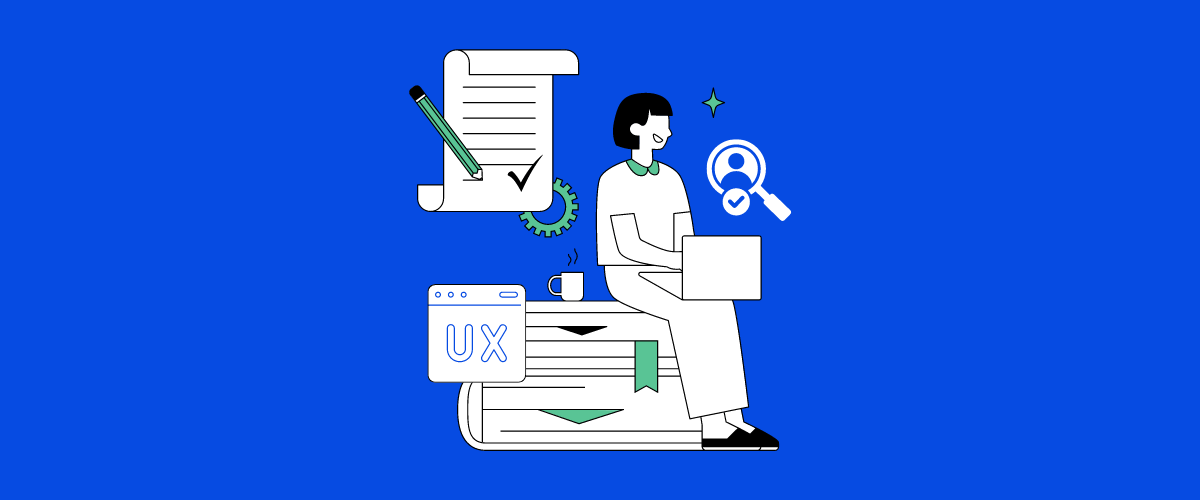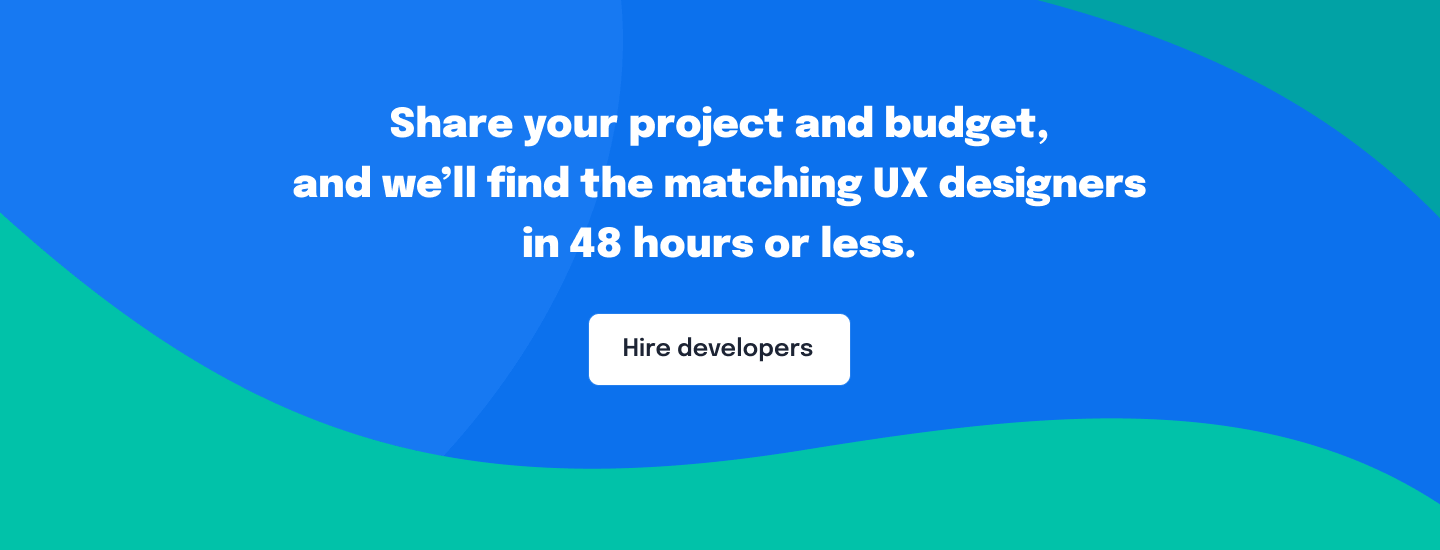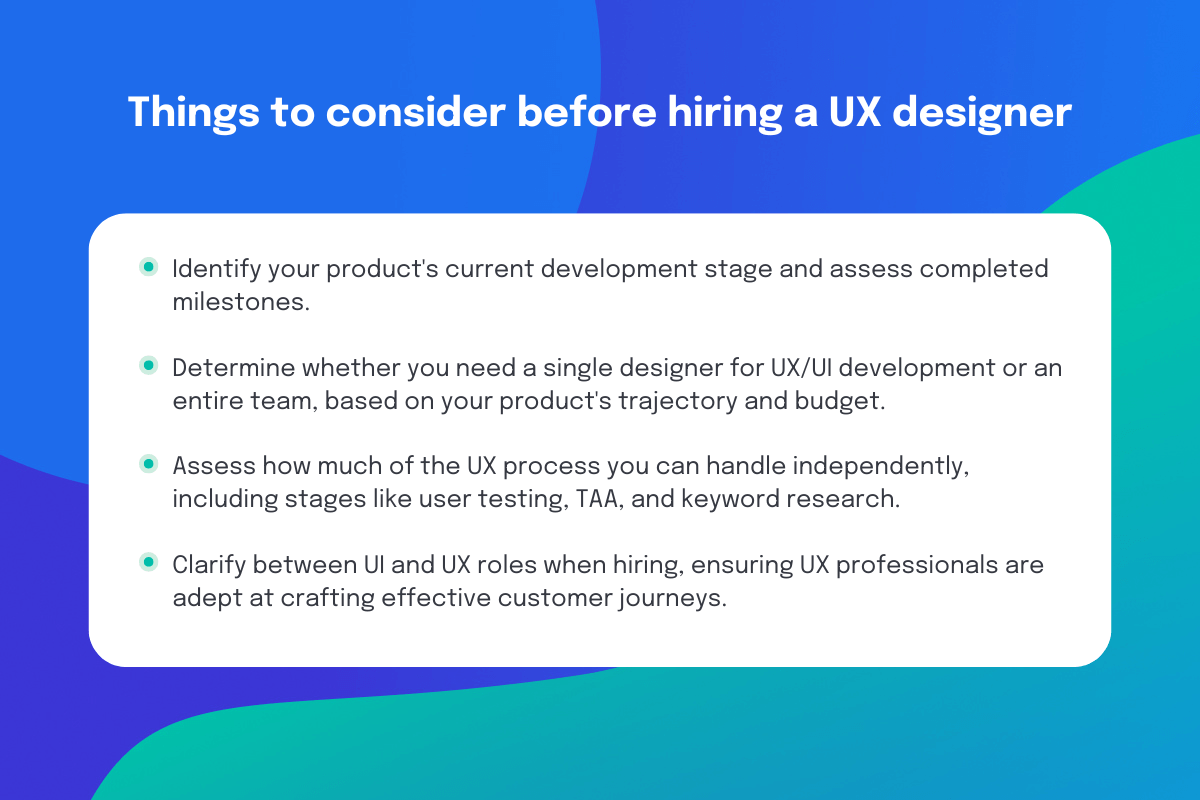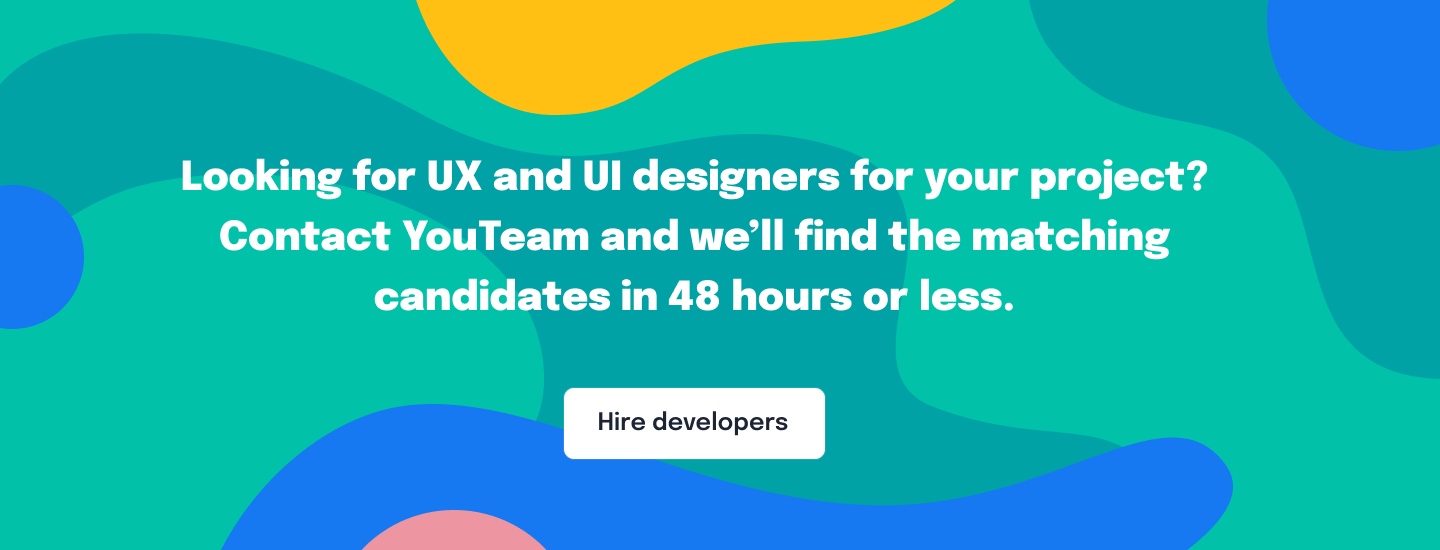Hiring a user experience (UX) designer is a solution for different projects and needs. You need a UX professional to launch your new app concept—from idea to functional prototype. It can also be a way to fine-tune your website, appealing to a wider audience—or narrowing it to a niche market. You need to know what you need before approaching the workplace because UX designers specialize in many different parts of the development and design workflow and process.
This article highlights the ins and outs of UX design so you’ll have a good understanding of the ins and outs of hiring a UX designer in 2024.
Table of Contents
What Are the Benefits of Hiring a UX Designer?
User experience defines how users behave with the product throughout their journey, including before and after interacting.
Therefore, UX designers try to understand the user, analyze your target audience, and understand how external factors influence their purchasing and behavior as it applies to your product.
Whether you have an application or website, the user interface is carefully adapted to minimize “dropoff,” or users’ disinterest. As a result, effective UX fosters sales and conversions—to get users to interact and maximize the time they spend with your product.
Designers understand that emotions affect user behavior. Therefore, hiring a UX designer allows you to understand how your product emotionally affects your users. Then you can make the right decisions to improve your users’ experience and increase sales and customer loyalty.
What Makes a Good UX Design?
Good UX design involves product planning that considers and incorporates the user from the beginning stages of development.
It starts with in-depth target audience analysis, the development of “persona examples,” and a consistent tone and style for your brand.
User experience designers will need to start again without this groundwork, interviewing your brand’s stakeholders to understand their commonalities and compare this sense of identity with the composed product.
Good UX designers will ask many questions, often metaphorically, about you, your team, and your intended users to understand the central values and interpret them to your audience.
What Mistakes to Avoid When Hiring a UX Designer?
Hiring new talent in your company is often challenging. Filling the position for a UX designer is no exception—many people think that this profession is about exceptional creativity. However, there are many other required tech skills to become a qualified professional.
Let’s delve deeper into what to consider when looking for a UX designer and the common mistakes employers make.
Hiring a UX Designer Just to Make Beautiful Prototypes
That’s a common misconception. Employers often focus on prototyping and storyboards in UX design, the initial visual stage of development.
Although the designer creates and delivers a beautiful design product, the target audience’s core analysis may have been overlooked.
If all you need is a beautiful design, you need a user interface (UI) designer, not a UX designer. The user experience focuses on people, their experience, and your product’s identity—not just about the way it looks.
Hiring a UX Designer Just for a UX Audit
User experience designers may also come into a project in the auditing phase or when the meat of the project is nearly completed. The main task for the UX designer at this stage might be to edit the website copy or look over the texts and graphics.
As we’ve mentioned, the UX development process focuses on understanding the audience and user experience. So, hiring a designer just to check some product parts is not a good idea.
People often hire a UX designer far too late in the process, which means they miss the chance to get a second opinion. A UX designer’s core study is about your product and brand’s personification and the users who interact with your product. Therefore, you should involve the designer in the stages of creating brand identity and style guides and give them full access to your company’s senior management and stakeholders so they can ask the necessary questions.
How Much Does it Cost to Hire a UX Designer?
Good UX designers often charge upwards of $75 an hour. For that price, they’ll create personas for your brand and perform a comprehensive target audience analysis. For simple prototyping and wireframing work, UX designers might charge $35 an hour or even less. However, these numbers are the specialists’ rates, not including additional expenses. If you hire in-house designers, you will also pay for the hiring process and have additional expenses like bonuses and taxes. The chart below compares the rates by hiring model.
| In-house UX designer from the US | Freelancer on Upwork | Candidate from YouTeam | |
| Average hourly rate | $85 | $54 | $61 |
| Extra costs | Taxes, bonuses, non-financial benefits, office rent, and support | Upwork commission | YouTeam commission |
| Hiring costs | HR costs, job promotional ads | Managers’ time for candidate sourcing, screening, and interviewing | YouTeam does candidates’ sourcing and assists with interviews for free |
Source: Salary.com, YouTeam, Upwork
Hire UX designers with YouTeam
If you’ve already done a lot of work, however, and you have style guides, user personas, and user experience journeys, you might be able to hire a less expensive designer.
If you want to learn more about UX journeys and personas, check out the resources over at UX Lady, where they talk about UX designers’ commitments in-depth.
How to Hire a UX Designer
First, identify the development stage for your product. What have you already completed?
- Keyword, market, and demographic research
- User research and target audience analysis
- Brand identity and style guide
- Stakeholder analysis and interview process
- User persona generation
- User experience journey analysis
- Wireframing, prototyping, and user testing
- A/B testing and market demographic research testing
- Product UX auditing
- Product marketing
- Product and customer support
As you move further along the product development process, your needs for a UX designer will change.
Specific tasks in their approach, like wireframing, are less demanding than functions like style guides that require interviews with your company’s significant influencers and stakeholders.
Ask Yourself: “What Are My Company’s Business Goals?”
Is your product on a fast track with a large marketing budget? Are you a startup or a new business with just a concept sketch? Depending on your budget and needs, you may need a single designer for all of your UX and UI development processes or the whole team to build software with your developers from scratch.
How Much of the UX Process Can You Complete On Your Own?
Many stages and processes are good to complete, even if you don’t need a UX designer right now. User testing, TAA, and keyword research can all be done by various tools and roles.
For example, UX developers might be helpful in executing designs and maintaining consistency across your apps. They can more easily complete projects with an established structure, such as adapting menus or maintaining a look and feel across a new web app to match the iOS app.
Suppose you’re looking for a professional for a completely new design process, and you haven’t done market research before. In that case, you’re more likely to need a senior UX designer to holistically look at your needs, build your product design and make it stand out above the other options on the market.
When you decide to hire a designer, consider signing an employment contract to keep the relationship professional.
Do You Need a Senior User Experience Designer?
If you cannot hire a senior qualified UX designer, that doesn’t mean you shouldn’t hire anyone. If your project and budget require a junior UX specialist, we highly recommend hiring a part-time senior specialist to consult you at the beginning. This professional can help identify your UX needs and create the core design structure. Then you can employ junior UX designers to take care of the defined tasks.
Also, be aware of designers marketing themselves as UI/UX. It can be hard to distinguish between UI and UX from the customer perspective, as we can often see them together as “UI/UX.” From the industry’s perspective, however, they are different characteristics. For instance, UI only deals with user interfaces, so when you are hiring a UI designer, you might need a graphic designer, not a thought leader or someone with skills in user behavior. However, when you hire UX professionals, they should be skilled in creating great customer journeys with your product.
When Can Junior Designers Be a Good Choice?
User experience can include animation and interactive design. Therefore, you might not need someone who calls themself a UX designer. You can search for animation designers on job sites and apply them to UX tasks like A/B testing.
Furthermore, you can have these designers introduce slight changes to your product, like adding animated buttons, and see how your user behavior changes.
Junior designers might not yet call themselves UX designers or UX developers and are more likely to occupy both roles. However, the lack of experience means that their “crazy ideas” might be genuinely original, out-of-the-box thinking, or just off on a tangent.
Many junior UX designers only know one platform, which matters when integrating their new designs into what your company already has. What’s more, some junior UX designers don’t know how to code. Additionally, not every UX designer works with every application or operating system, so you’ll need to make sure they’re familiar with the ecosystem and unique workflows associated with your product’s platform.
If you have a design team, a junior UX specialist is a good option, as they will grow with others. Newcomers often learn much more, and even if they are not familiar with your team’s toolset, they can upskill quickly. So, hiring junior specialists is a great option if you can hire a UX consultant to help initially or if you already have other experienced UX designers on your team.
Interview questions for a UX Designer
Once you have the technical requirements in place, you are ready to review a few UX designer portfolios and prepare for an interview session to ensure the candidate is the right fit. An experienced UX designer’s portfolio shows the thought process behind each completed solution and reveals the designer’s problem-solving skills and ability to create the most efficient user journey.
If the UX designer’s portfolio does not explicitly answer all the questions you are looking for, make sure to ask them during the interview.
In addition, to make sure that the UX designer will truly succeed in the project, you need to examine their clear communication and active listening skills to see if they can collaborate with different teams and connect with the product and customers.
Here are a few questions to consider when interviewing a UX designer:
- Have you worked with a similar client before? What was your experience, and what would you like to improve?
- What portfolio projects best define your strengths and why?
- Tell us about a design problem that challenged you. How did you overcome the challenge?
- Looking at our brief, do you need additional time to delve deeper into a specific area to successfully complete this project?
- Are there any projects or specific tasks that you are just not interested in working on?
- What are your favorite examples of a good user experience?
- How do you decide which user research method to use?
Top UX designer hiring strategies: Freelancers, outsourcing, staff augmentation, and in-house hiring
When choosing a hiring model, there is no one-size-fits-all approach, as your strategy depends on your project needs, preferences, budget, and the current labor market. Below, we look at four hiring options.
Hiring freelancers
Hiring a freelance UX designer is great for short-term projects and small companies. Freelancers usually require more time for management as they may communicate less and share less knowledge with different teams within the company. Therefore, managers need to set clear expectations and goals for freelance designers, as well as a detailed project description.
Companies can turn to freelance websites such as Upwork or Toptal to hire UX designers and manage payments.
Hiring an outsourcing company
Outsourcing enables organizations to reduce operational costs and avoid investment in employer benefits, training, and onboarding. Additionally, in contrast to hiring freelance UX designers, outsourcing implies more organized communication between the client and designers.
Finally, partnering with design agencies implies different ways of cooperation, from dedicated teams to IT staff augmentation.
You can find UX design service providers on G2 and Clutch. You can also browse hundreds of UX design services on LinkedIn and filter by location and company size.
Staff augmentation: A new way of outsourcing
A model called staff augmentation uses full-time employed software engineers from outsourcing agencies to increase their existing in-house team. However, unlike assigning or handing over an entire design project to an IT outsourcing company, organizations manage UX designers and communicate with them directly. Staff augmentation also gives a company the flexibility to scale up or down its design team quickly, making it useful for projects with fluctuating demand.
Companies can hire UX designers with the required skills using the wide talent pool of YouTeam contractors from Eastern Europe and Latin America.
In-house hiring
Tech businesses use in-house hiring to build their core team and culture with full-time employees. Companies hire an in-house UX designer so that they can explore the product in detail, best understand the business needs, and quickly connect with other teams. This step is most justified if the company has a stable workflow that requires constant work on new designs.
Employers can use online job boards like Glassdoor or search LinkedIn profiles by filtering by location, industry, and service categories. Employers can also find UX design meetup groups or meet professionals at UX design conferences such as Interaction or UX London.
Top UX/UI Designer Positions: Whom to Hire in 2024
UI Strategists: they are like UX designers who specifically look at your digital user interface’s layout.
They’ll maximize the way your app performs on your platform or device and help your users be more intuitive and natural.
iOS/Android UX Designers: such specialists specifically know the ecosystem of iOS and Android operating systems, and they ensure your product runs smoothly on different devices, including smartphones.
They can help you understand how your users perceive your brand as a mobile app, always with them in their pocket.
UX/UI Relationship Managers: can help your company interface with your partners and integrate great user experiences. They’ll determine how users behave differently between your app and your partner’s apps, and they will help identify synergies between the two companies and brand identities.
Adobe UX Design Managers: might specifically work with Adobe XD, Spark, and other professional UX design toolsets. Managers are often required to help transition UX from one stage to another and allow individual designers to deep-dive or specialize in their specific part of the workflow.
Your UX design managers can see the big picture and connect many UX designers into a comprehensive unit.
UX Designer Recruiters: you can help decide what type of UX designer you need. If it’s all too much information to choose from, there are people to help. User experience is a complicated industry, bridging the gap between behavioral psychology, data science, engineering, and the pure art of design.
The good news is that if you need them, UX designer recruiters understand that you’re busy. They work hard to find just the right team for you, so you can focus on running your company.
What Are the Popular Resources to Look For UX Designers?
- Dribbble: An inspirational desk for designers where you can find and hire specialists open for opportunities.
- UX Collective: A blogging resource for designers, by designers. A great place to learn about all things design and find professionals.
- Behance: Adobe-centric creative social network for designers to market themselves, find collaborators, sell their work, and post job opportunities
- Designer News: Many designers promote themselves and their favorite resources here.
However, sometimes freelancers cannot provide quality solutions. To find an experienced UI/UX designer with high-level expertise, you may need to spend at least a month just searching and interviewing. Furthermore, you have to verify the skills of your potential candidate, but if you come from a non-design background, it would be challenging indeed.
You can browse verified profiles of UI/UX Designers working in professional agencies, check out their hourly rates, and partner with YouTeam to help you hire needed specialists in less than a week.









